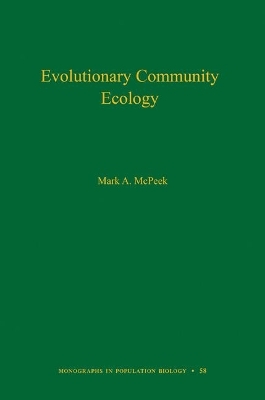
Evolutionary Community Ecology
Seiten
2017
Princeton University Press (Verlag)
978-0-691-08877-8 (ISBN)
Princeton University Press (Verlag)
978-0-691-08877-8 (ISBN)
Evolutionary Community Ecology develops a unified framework for understanding the structure of ecological communities and the dynamics of natural selection that shape the evolution of the species inhabiting them. All species engage in interactions with many other species, and these interactions regulate their abundance, define their trajectories of natural selection, and shape their movement decisions. Mark McPeek synthesizes the ecological and evolutionary dynamics generated by species interactions that structure local biological communities and regional metacommunities. McPeek explores the ecological performance characteristics needed for invasibility and coexistence of species in complex networks of species interactions. This species interaction framework is then extended to examine the ecological dynamics of natural selection that drive coevolution of interacting species in these complex interaction networks. The models of natural selection resulting from species interactions are used to evaluate the ecological conditions that foster diversification at multiple trophic levels.
Analyses show that diversification depends on the ecological context in which species interactions occur and the types of traits that define the mechanisms of those species interactions. Lastly, looking at the mechanisms of speciation that affect species richness and diversity at various spatial scales and the consequences of past climate change over the Quaternary period, McPeek considers how metacommunity structure is shaped at regional and biogeographic scales. Integrating evolutionary theory into the study of community ecology, Evolutionary Community Ecology provides a new framework for predicting how communities are organized and how they may change over time.
Analyses show that diversification depends on the ecological context in which species interactions occur and the types of traits that define the mechanisms of those species interactions. Lastly, looking at the mechanisms of speciation that affect species richness and diversity at various spatial scales and the consequences of past climate change over the Quaternary period, McPeek considers how metacommunity structure is shaped at regional and biogeographic scales. Integrating evolutionary theory into the study of community ecology, Evolutionary Community Ecology provides a new framework for predicting how communities are organized and how they may change over time.
Mark A. McPeek is the David T. McLaughlin Distinguished Professor of Biological Sciences at Dartmouth College.
Acknowledgments ix
1 Ecological Opportunities, Communities, and Evolution 1
2 The Community of Ecological Opportunities 23
3 Evolving in the Community 76
4 New Species for the Community 137
5 Differentiating in the Community 176
6 Moving among Communities 223
7 Which Ways Forward? 257
Literature Cited 275
Index 311
| Erscheint lt. Verlag | 29.8.2017 |
|---|---|
| Reihe/Serie | Monographs in Population Biology |
| Zusatzinfo | 56 line illus. 4 tables. |
| Verlagsort | New Jersey |
| Sprache | englisch |
| Maße | 152 x 235 mm |
| Gewicht | 567 g |
| Themenwelt | Naturwissenschaften ► Biologie ► Ökologie / Naturschutz |
| Naturwissenschaften ► Geowissenschaften ► Geografie / Kartografie | |
| ISBN-10 | 0-691-08877-2 / 0691088772 |
| ISBN-13 | 978-0-691-08877-8 / 9780691088778 |
| Zustand | Neuware |
| Haben Sie eine Frage zum Produkt? |
Mehr entdecken
aus dem Bereich
aus dem Bereich
Buch | Softcover (2024)
Springer Vieweg (Verlag)
49,99 €


